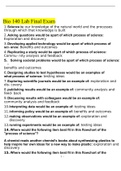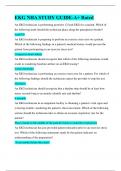Summary
Summary Case sheet for contract law
- Course
- Institution
A case sheet for contract law in these specific areas: consideration, promissory estoppel, intention to create legal relations and implied terms
[Show more]Some examples from this set of practice questions
1.
How many types of consideration is there and what are they?
Answer: Three. 1) Executory 2)executed 3) past consideration
2.
What is consideration
Answer: Wherein both parties should something out of it. “An act of one party or the promise, is the price for which the promise of the other is bought, and the promise thus given for value is enforceable” Per Dunedin Lj, Dunlop v Selfridge 1915
3.
What is executory consideration?
Answer: The promise of party A is made in return for the promise of party B
4.
What is executed consideration?
Answer: One party has executed their half, the other party’s consideration is still executory (yet to be done).
5.
What is past consideration?
Answer: A service provided by one party before the promise of a reward is made by the other party
6.
What are the golden rules for consideration?
Answer: 1) C must not be past 2) C must move from the promise 3) C must be sufficient, not adequate 4) C must be performance on an existing obligation either under a) a contract or b) law.
7.
What’s not considered good consideration?
Answer: Part payment
8.
What’s the case for consideration must not be past
Answer: Re Mcardle (1951)

Stuvia customers have reviewed more than 700,000 summaries. This how you know that you are buying the best documents.

You can quickly pay through credit card or Stuvia-credit for the summaries. There is no membership needed.

Your fellow students write the study notes themselves, which is why the documents are always reliable and up-to-date. This ensures you quickly get to the core!
You get a PDF, available immediately after your purchase. The purchased document is accessible anytime, anywhere and indefinitely through your profile.
Our satisfaction guarantee ensures that you always find a study document that suits you well. You fill out a form, and our customer service team takes care of the rest.
Stuvia is a marketplace, so you are not buying this document from us, but from seller soniyabegh. Stuvia facilitates payment to the seller.
No, you only buy these notes for $10.64. You're not tied to anything after your purchase.
4.6 stars on Google & Trustpilot (+1000 reviews)
65040 documents were sold in the last 30 days
Founded in 2010, the go-to place to buy study notes for 15 years now




